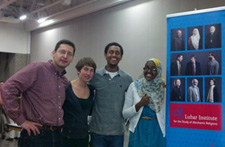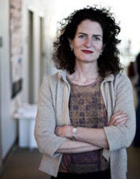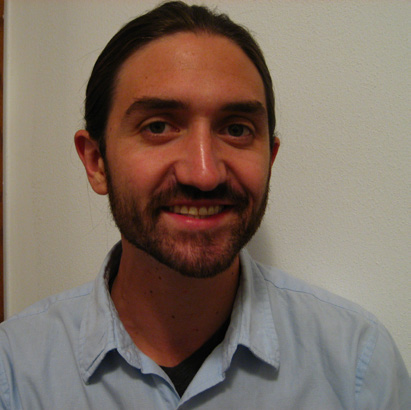

Vol 3, Issue 2 • December 2012
Deepening Belief while Exploring other Traditions
Fellows' responses to Charlotte Gordon
 Each month our Undergraduate Fellows write personal reflections about their year-long experience at LISAR. This fall, most of them have highlighted the importance of their time with Charlotte Gordon, the Institute’s Thering Fellow for 2012, who led a writer’s workshop and delivered a public lecture on the personal background to her book, The Woman Who Named God, which explores the intricate relations between Abraham, Sarah, and Hagar.
Each month our Undergraduate Fellows write personal reflections about their year-long experience at LISAR. This fall, most of them have highlighted the importance of their time with Charlotte Gordon, the Institute’s Thering Fellow for 2012, who led a writer’s workshop and delivered a public lecture on the personal background to her book, The Woman Who Named God, which explores the intricate relations between Abraham, Sarah, and Hagar.
Gordon’s lecture revealed how Hagar, the mother of Abraham’s first son, Ishmael, played a critical role in her own spiritual quest. Reared as an Episcopalian, Gordon as a young adult found out that her father had been born Jewish. Stunned by the revelation, she immersed herself in studying Judaism and eventually converted. During this quest, she struggled with her perceptions that Genesis portrays Abraham and Sarah, the Jewish Ur-parents, unsympathetically, and that it marginalizes Hagar. Researching their stories further, she found a very different figure of Hagar in Islamic traditions outside the Qur’an. In these stories, Abraham himself leaves Hagar and her son in the desert. Although dying from thirst, Hagar nevertheless persists in searching for water, and, with Allah’s help, she succeeds. Muslims annually re-enact her endeavors as part of the Hajj, the pilgrimage to Mecca. For Gordon, Islam provides an alternative vision of Hagar, a strong woman who does not let go of her God. Empowered by Hagar’s model, Gordon followed her---into Judaism.
The workshop further illuminated the connections between the scholarship that informs The Woman Who Named God and the book’s personal meanings for its author. Gordon told the participants that she considers writing a spiritual regimen, an ongoing journey towards God, just like daily study of Torah, or compassionate service for others.
 The notion of being empowered by a narrative from another Abrahamic tradition struck a nerve among the Institute’s Fellows. One, a Muslim, shared that he was taught to look at the prophets as perfect beings. But, he lamented, because they had been so idealized, he had a hard time relating to them. Prophets like Abraham are quasi-mythological figures, but Gordon’s book, he acknowledged, helped to humanize Abraham, to give him a face and make him a character with real emotions. A Christian Fellow remarked similarly that The Woman Who Named God gives the biblical characters their humanity back. Gordon’s visit catalyzed some serious soul-searching in one of our Jewish Fellows. Would I still be Jewish today, he pondered, if my parents had taken me to church every Sunday? Is there an unshakable core of my Jewish religious identity?
The notion of being empowered by a narrative from another Abrahamic tradition struck a nerve among the Institute’s Fellows. One, a Muslim, shared that he was taught to look at the prophets as perfect beings. But, he lamented, because they had been so idealized, he had a hard time relating to them. Prophets like Abraham are quasi-mythological figures, but Gordon’s book, he acknowledged, helped to humanize Abraham, to give him a face and make him a character with real emotions. A Christian Fellow remarked similarly that The Woman Who Named God gives the biblical characters their humanity back. Gordon’s visit catalyzed some serious soul-searching in one of our Jewish Fellows. Would I still be Jewish today, he pondered, if my parents had taken me to church every Sunday? Is there an unshakable core of my Jewish religious identity?
By demonstrating how to put different Abrahamic narratives in conversation with each other intelligently and respectfully, Charlotte Gordon inspired and emboldened not only our fellows but also, I suspect, everyone who heard her. As one student put it, she showed each of us how to deepen one’s own belief by exploring another tradition.
![]()
 This semester I have been teaching an introductory course in UW-Madison’s Religious Studies Program on what I like to call a “braided history of Judaism, Christianity and Islam” that covers a mere three millennia or so. Beginning with the earliest forms of Judaism in Ancient Israel, it presents the religions not as static entities developing in isolation, but as traditions that have evolved in contact with each other and whose adherents have entered into different relationships—many of them unlovely, to be sure—contingent on such factors as demographic ratios between religious groups, cultural expressions mediating one or another facet of the traditions, and—something I have emphasized—the political position in which the religious communities found themselves. To be honest, writing the lectures has stretched me to limits that would tax even Silly Putty’s capacity to remain whole. I ache for the Winter Solstice.
This semester I have been teaching an introductory course in UW-Madison’s Religious Studies Program on what I like to call a “braided history of Judaism, Christianity and Islam” that covers a mere three millennia or so. Beginning with the earliest forms of Judaism in Ancient Israel, it presents the religions not as static entities developing in isolation, but as traditions that have evolved in contact with each other and whose adherents have entered into different relationships—many of them unlovely, to be sure—contingent on such factors as demographic ratios between religious groups, cultural expressions mediating one or another facet of the traditions, and—something I have emphasized—the political position in which the religious communities found themselves. To be honest, writing the lectures has stretched me to limits that would tax even Silly Putty’s capacity to remain whole. I ache for the Winter Solstice.
Student evaluations will not be available until after the Newsletter has appeared, so I cannot disclose what the students may think, but I myself have certainly learned a great deal. The enterprise has, not surprisingly, reaffirmed for me the value of comparative history; Judaism, Christianity and Islam in the modern world are not frozen distillates of ideal types, but current instantiations of ongoing historical dynamics. Too, I have come to appreciate the Lubar Institute’s academic side more fully. Many of our most central activities—the Student and Community Forums, the Fellowship program, indeed, our weekly staff meetings—engage Muslims, Christians and Jews in projects whose value lies in the knowledge gained by collaborative experience, not book learning. But LISAR does exist at a university, after all, and the academic programming we sponsor— lectures, symposia, forums, and conferences—provides an intellectual scaffolding for the training in religious literacy and civility that our more participatory civic ventures promote. After this semester, I think I am better equipped to advance our community programming by having hit the library for so many weeks.
![]()
LISAR Student Fellow Voice
Eric Luckey, Undergraduate Fellow, 2005-2006
 In September of 2005, I asked the pastor of the Lutheran congregation in which I was raised to write a letter of recommendation for me. In that letter he expressed my beliefs and my commitment to those beliefs as completely assured. In fact, this depiction couldn’t have been further from the truth. My religious beliefs had never been so uncertain, with one foot precariously rooted in the past, the other desperately groping for any solid ground. And so it was against this backdrop that I walked into Dr. Cohen’s office to interview for the first group of LISAR undergraduate fellows in Fall, 2005.
In September of 2005, I asked the pastor of the Lutheran congregation in which I was raised to write a letter of recommendation for me. In that letter he expressed my beliefs and my commitment to those beliefs as completely assured. In fact, this depiction couldn’t have been further from the truth. My religious beliefs had never been so uncertain, with one foot precariously rooted in the past, the other desperately groping for any solid ground. And so it was against this backdrop that I walked into Dr. Cohen’s office to interview for the first group of LISAR undergraduate fellows in Fall, 2005.
There was a certain buzz when that first group came together, eager to plow into an open frontier. And though we set our focus on generating ideas for undergraduate outreach, for me, the ideas we discussed were no more important than the act of us coming together, a symbolic and practical (and perhaps sacramental!) representation of the LISAR ethos. For the first time in my life, I had substantial conversations about religious belief and experience with members of the other Abrahamic religions, and not in the bellicose tone of Christian apologetics I was trained in, but simply as people who could understand each other.
My experience as an undergraduate fellow helped me transition from a narrow theological world view to a simple desire to see how people live their lives and understand why they believe what they do. LISAR taught me the strength of pluralism and the value of simple, human interaction. Those lessons have stayed with me as I’ve traversed the diverse classrooms of the Minneapolis Public Schools, as a political organizer reaching out to Somali communities in urban high-rises, and while integrating into the culture and community of rural Mongolia as a Peace Corps volunteer. And I’m sure the list won’t end there.
Back to Contents
![]()
One of LISAR's major projects this past semester was the production of a short video that brings to life the important work the Lubar Institute is doing on campus. If you have a few minutes, please take a look at http://vimeo.com/52875748 and feel free to share it with your networks. We'd appreciate your help in getting the Institute's word out.
![]()
Supporting the LISAR mission

As you and your family make your decisions regarding year-end charitable gifts, please consider supporting the mission of the Lubar Institute. Each and every contribution to LISAR offers the chance to participate in a vitally important effort: the bringing together of Muslim, Jewish, and Christian students, faculty and community members to share ideas, learn about other faiths, and increase their understanding of their own. Even the smallest gifts enable LISAR to do something we could not otherwise have accomplished. We encourage you to visit our website to learn more about how your support can make a difference.
The campaign for LISAR, like the Institute itself, is unique; it could only happen at a public institution with a long tradition of civic involvement like UW-Madison. You can make a gift online, or for assistance in making a gift by mail, or to discuss further giving opportunities, please contact our UW Foundation representative:
Stephen Wald,
Director of Development
University of Wisconsin Foundation
608-263-2202 (office)
608-287-6480 (cell)
stephen.wald@supportuw.org
Making a gift online: If you would like to make an online donation to the Lubar Institute via secure server, please visit http://lisar.lss.wisc.edu/welcome/giving.html
Back to Contents
